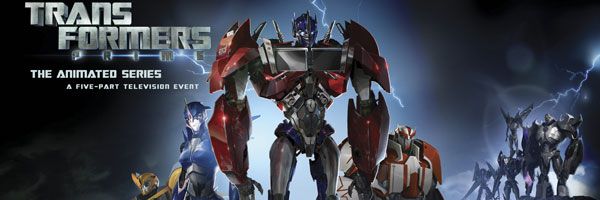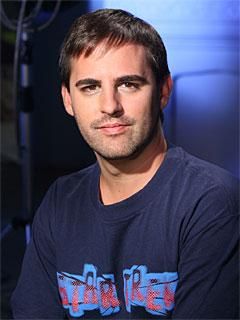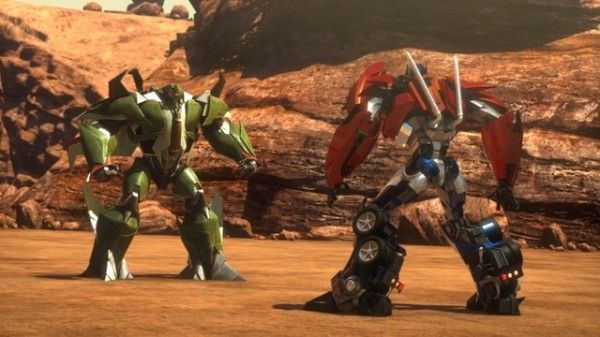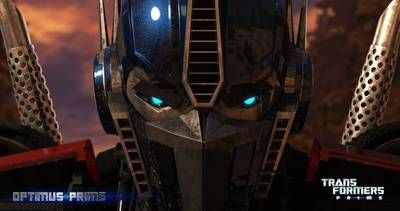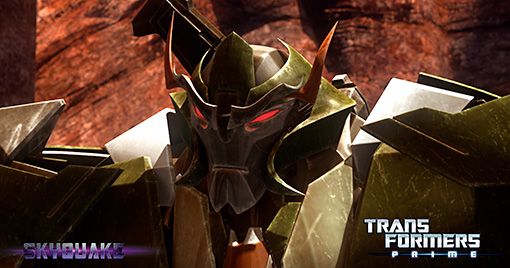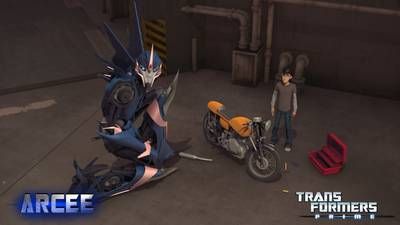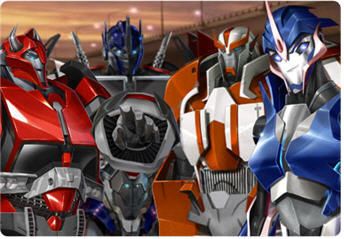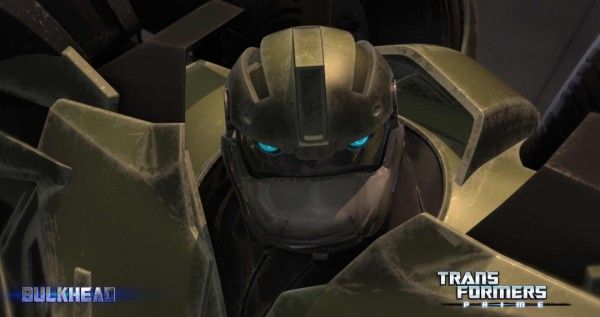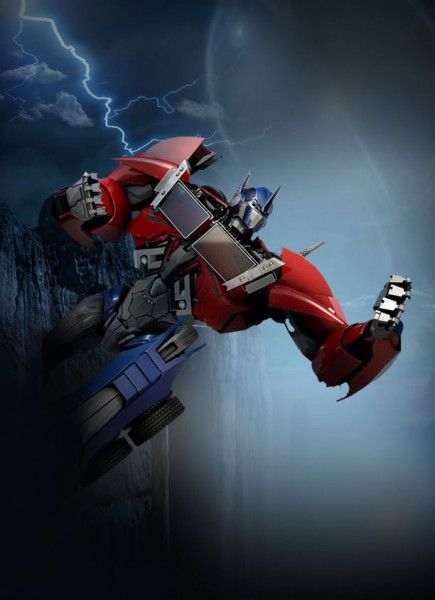This Friday, February 11th at 6:30 p.m. ET The Hub (formerly Discovery Kids) will roll out the latest animated iteration of Transformers via its series Transformers: Prime. Having recently caught the show's pilot episode, I'll briefly synthesize the series as such: Transformers: Prime seems to be set in an alternate Transformers universe free of either Sam Witwicky or a giant planet-devouring Orson Welles. In the series, Optimus remarks that it’s been three years since the last Decepticon attack. This, of course, is rather short lived as Megatron rises from wherever he’s been hiding and attempts to raise an undead army of Transformers using something called dark energon (don’t ask) to defeat the Autobots and destroy/enslave all of humanity.
With this synopsis in mind, I had recently had the opportunity to catch up with four gentlemen who are heavily involved with Transformers: Prime - executive producers Roberto Orci and Jeff Kline, Vice President of Development for Hasbro Studios, Mike Vogel, and Director of Programming for The Hub, Scott Pennington. In a lengthy roundtable interview, the four discussed a ton of topics including Bumblebee's inability to speak the human language, casting Frank Welker and Jeffrey Combs, the future of the series, and my questions regarding some of the show's robot/human romantic chemistry. Check out what each had to say after the jump:
You’ve obviously culled from many different aspects of Transformers history – was your overall approach going in that you were going to do that - sort of pull from different iterations [of Transformer’s lore]?
ROBERTO ORCI: After the movie’s came out, Hasbro did a pretty good job of coalescing all the mythologies that they had institutionally for years. Actually putting it down to paper. There are people, who I think if they had been killed in the organization – you guys would have been screwed – only because a lot of thought went into creating this master file that we ended up referring to that happened to dovetail with what we wanted to see [but] couldn’t do in the movies. So even though, [we’re] pulling from a lot of places, I think the goal was to have a master continuity.
JEFF KLINE: If I remember correctly – I actually think the document is about 400 pages
MIKE VOGEL: It’s huge.
KLINE: It’s single-spaced. About 400 pages.
VOGEL: My first day at work – they handed me this stack of papers – it was just the entire continuity of the Transformers verse. I think what has continued to happen with the show is that Transformers is such a generational thing – everyone in here has had a different experience. There was G1, there was Beast Wars, there was the animated [show]… there’s been so many versions. We’ve reached a point now that the creative team on Transformers is so varied that everyone has their own favorite so I think naturally little pieces of all of it end up coalescing into Prime, which has been really exciting to watch.
ORCI: We weren’t trying to do that. We were just going for what seems to fit all together into a unified thing and wherever it comes from doesn’t matter. Best idea wins.
Will Bumblebee ever learn how to speak the human language and so far there’s a very central core cast for the autobots and decepticons – is there a potential to see different favorite characters ever come along perhaps such as Jetfire or any other decepticon in the future?
KLINE: I’m taking the first question first. It’s not that Bumblebee can’t speak. It’s that Bumblebee has a reason he can’t speak, which will be revealed in season two. So whether we actually solve that problem before our particular Prime arc is over or not, I can’t say – but there is a reason for it and off-screen at least, he’s been working towards trying to solve that issue for himself. Second question, the answer is yes – we absolutely want to feature more both autobots and decepticons. Quite honestly – our philosophy is: we always want to have the autobots be at a disadvantage. We always want to have fewer autobots then decepticons.
It just makes their job that much harder. In season one and in season two, you’re going to meet a number more bots and cons. Quite honestly, doing a CG show – we are a little more limited than we might be in a cell animated/traditional animated show – just because the most time and money intensive part of CG is upfront with the bills. So we do have some limits to the number of characters that we both can build up front and feature on screen in the time it takes. Its that much more render time to feature multiple characters on screen at a time. As you’ll see – we have a lot of characters especially when you think of the fact that each of our bot or con characters count as three because we have to build them as a bot, a vehicle and in transformation mode. So while it may seem like we have twelve leads – it’s actually thirty because we had to build three distinct computer builds for each of those.
Jackson and Arcee – they seem to have some sort of romantic relationship, a little bit of hints of a romantic relationship between the two in the miniseries and slightly in this pilot episode. I was wondering if you would be willing to explore that in what is ostensibly a children’s television show?
KLINE: I would not categorize the man machine relationship as romantic. I think for Jack she represents a tough older woman who could definitely give him advice, whether he wants it or not. She can be a bit of a mentor figure to him. But I honestly don’t think we’re going to get into romance. That’s just… weird.
I mean to paraphrase the end of the miniseries – there’s a moment where [Arcee’s] injured and [to comfort Jackson] she says there are plenty of other motorcycles out there. And he responds ‘oh but you’re my first’. I mean it’s hard to… you don’t see anything there?
KLINE: I don’t know where your sick, sick mind has been.
ORCI: But it does fall in line with the idea of when it’s your first vehicle and your first road to freedom and adulthood – there is a gateway there in which she represents. But I don’t think they’re going to go to Prom together.
KLINE: Actually I do want to do a Prom story.
ORCI: There we go – we got a Prom story out of this.
Can you talk about the casting and bringing Frank Welker back and the awesomeness of Jeffrey Combs being in this.
ORCI: First of all meeting him – I’d advocated for Welker in the movies – and then to finally meet him on the first day of recordings, he said to me ‘hey I actually really appreciated your support online’ and I had no idea he even followed such things. It was an instant oh-my-gosh it’s great to meet you and now we’re doing it so don’t worry about it.
KLINE: Putting Peter and Frank together again – they literally in the way that you think (a shot at me) love each other.
VOGEL: It was like seeing Simon and Garfunkel.
KLINE: Except they like each other. As far as Jeffrey Combs – we make up wish lists as we write the characters about who would be great [in the role] and we also turn it over to casting directors and agents and get a whole bunch of auditions in and do sessions. Jeffrey Combs, in particular, our supervising director on Primes - a guy named Dave Hartman, who if you know him at all he’s obsessed with monster movies and Don Corascelli and all that stuff. Jeffrey Combs is a particular passion of his. One of the nice things quite honestly about animation is again we make up a kind of a wish list. It’s pretty rare that we can’t get who we want whether it’s for a recurring role or a one-off.
I think a lot of times the idea of putting on your sweatpants and coming into a room for four hours and record[ing] these radio-style with all the actors in the same room at the same time – it’s actually a lot of fun for an actor. They may have tremendous pressure on a show that they’re carrying – you know, a sitcom that they’re the lead of – but for four hours they get to come in and they’re only as important as the guy over here who can do fifteen different animal voices or whatever it is and I think that that’s actually a lot of fun for them. Obviously we got Dwayne Johnson to do a pretty small role in the miniseries.
ORCI: He’s The Rock
KLINE: But he was our first choice and we went to him…
VOGEL: And watching Dwayne Johnson in a record session and [someone asking] ‘can you make some fight noises and then some zombie noises’ and he’s like ‘arghhh’ [and you’re like] ‘that’s good… that’s good’. I think the other thing that’s cool – the first day you go into the record session and you sort of meet Peter Cullen and Frank Welker and they look like two guys you would see at a Bar Mitzvah and then they go into the record booth and they open their mouths and you have these childhood flashbacks. You’re like ‘oh my gosh’. It was awesome.
(Spoiler question in regards to the premiere of Transformers: Prime. Read the next two paragraphs at your own risk.)
Is Skyquake dead?
KLINE: In our minds when we kill a character, we kill a character. I can assure you that CliffJumper is dead. We wanted to very clearly in the miniseries and now in episode six, unlike some other iterations of Transformers or just animation in general, [to make] sure that you knew he wasn’t just dead but dead dead… dead, dead, dead, dead. Cut up into pieces dead.
Content wise – you have some pretty cool, semi-dark stuff. You had zombie-transformers for the first time. What were the discussions you had about the line and not going too far especially knowing it’s going to appeal to very different ages at this point?
ORCI: You want to push it a little bit but you still want it to be so that the whole family can watch it and everybody can dig it. I think the movies are maybe one step further than what we would like to go for the show.
KLINE: In general, what we’ve found over the years is that you don’t have to write down to any particular audience. As long as there’s a clear emotional through-line to the story, any age is going to grab onto it. They may not get all the references you threw in there but they’re going to follow along with the story because they’re invested in it. We didn’t want to make a show that would frighten kids. We didn’t want to make a show that parents wouldn’t allow their kids to see. We could of done a much more realistic, violent show but it defeats the purpose of trying to bring a whole new generation into these franchises. So we’re constantly walking the line and throwing it around and asking is that too much and quite honestly, we’re not sure what the answer is until we get the feedback from the people who watch it.
Can you talk about the attraction, now that you’re no longer with the Transformers film series – the attraction towards bringing this to an animated series for kids?
ORCI: Well, from the beginning, especially before we had actually seen a live action Transformers movie, there was a lot of perceived limitation as to what we could do – in terms of how much you could show the Transformers because they were so expensive per minute of screen time. So therefore paradigms for the movie had to be crafted, that while we ended up being very proud of, - as fans of Transformers having grown up seeing a little bit more Transformers-centric movies, there were things we wanted to do in the movies that we just couldn’t and there were character arcs we wanted to explore of the Transformers that we couldn’t. We wanted to show more of their mythology and their past and their planet and just hang out with them, you just want to hang out with them, and in the movie, every time you did that – it was very special but extremely limited.
So there was always another way into the paradigm of what we wanted to tell as Transformers stories and this was just a lucky accident that then we got an opportunity to actually pursue that inspiration and find stuff that we never had even actually thought of for the movies because it becomes its own thing. And then in terms of television - whether or not there had been limitations in the movies or not – in a movie, even if we had every dollar we wanted it’s still only two hours. And here we’re talking about season long arcs where you really get to make cool moves and spend time on them and really have the characters have an emotional memory going forward. So it’s just something you can’t do in the movies. That’s why we’ve always actually stayed between TV and movies because they give you different satisfactions as a fan and as a storyteller.
Are you pleased with this process? In the future with one of your other franchises, [would you] work on a project like this again?
ORCI: I mean we’re talking about doing other things together just based on these experiences.
KLINE: I just want to add to that – when I first sat down with Bob and Alex, to be quite honest my anticipation was that it was going to be a relatively cursory meeting where two guys who were not going to be very involved in the series want to talk and that will be the last I saw them. [But] they’re incredibly involved. This is not a situation [of] “in-name-only” they’re on [T: P]. This is their show. And I think you can tell because the quality is so good.
ORCI: I think that’s mostly true…
KLINE: Not Alex because he cant even bother to show up.
[Are] there more female viewers nowadays [for Transformers]?
SCOTT PENNINGTON: We actually got great numbers from both genders for the miniseries so far. Clearly there’s a wanting to reinvent the franchise for a whole new generation. You don’t want to be exclusive in any ways. So I think having Arcee there, having Mika – she’s actually already a really big fan favorite based on the first five --so I know that was part of what they were going for.
KLINE: And I think the other side of that is – the more emotional stories you tell, the more appeal there is to females. So this isn’t just a show about battling. It’s also every character has stuff going on underneath, relationships grow and change over time and will continue to and quite honestly, yes – we tried from the beginning to be a more welcoming universe.
ORCI: I find it more entertaining. It’s a better world. You get better more sophisticated stories – so just pursuing that as an ethic is its own reward. You’re leaving money on the table if you don’t do that.
VOGEL: I think the really exciting part more than having girls in the show and a girl presence that brings girl viewers is the fact that both Arcee and Miko have popped on both sides. So a lot of times when you’re a kid watching the show, you’re like ‘oh yeah – there’s the girl but let’s get to the action.’ We were watching those first five episodes and I was like ‘Arcee’s the most badass out of all of them.’ She’s by far action wise – all over the place. When you look on the fan sites. When you just talk to people about the show – to have a young kid, a six-year-old boy and you [go] ‘Hey do you like Transformers?’ [and he responds] ‘Yeah, Arcee was awesome.’ That’s actually the really cool thing – the cross fandom in addition to the cross viewing.
KLINE: The other thing we’ll say about Miko – the studio we work with in Tokyo, Japan are in love with Miko. So we will do things in board that are very simple – Miko just throws up her hand – and it’ll come back she does a pirouette and a spin. Miko’s on screen more time than we intended just because [all the] footage they send to us with her is triple what we ask them for.
Soundwave had a detachable drone in the [pilot episode]. Was that meant to be Laserbeak or was it just a part of Soundwave?
KLINE: It is. Whether we call it Laserbeak or not, it is obviously a homage to Laserbeak.
When will we see toys for Transformers: Prime?
VOGEL: [sarcasm] Hasbro doesn’t really do toys. But we’re thinking about maybe going out to that area. We’re really just commercializing. [end sarcasm] There will be toys. Stay tuned for announcements sooner than you may think.
Are there any characters you can mention coming up?
KLINE: You have to watch.
VOGEL: There’s a really cool security guard coming up. He’s pretty fantastic. He transforms into a janitor… I will say very soon, in the next few episodes – you’re actually going to see a few familiar faces and there’s going to be some new faces as well.
KLINE: One thing I would actually like to say – there’s going to be a kick ass female Decepticon on her way.
If you look back on the classic Saturday morning cartoons of the 70s and 80s – the original Transformers, the original G.I. Joe, even Super Friends – they always had a life lesson for the kids. There seems like there’s a bit of that in the show. Was that important for you guys – to sort of put that into this series?
ORCI: We think of it that way a little bit. But mainly we just wanted to make sure that every show has a theme and that the theme comes from character. It’s not like we’re running down the list of Surgeon General’s warnings on how to grow up. It’s coming out of what are they really going through as characters. But I’m glad you’re detecting that.
KLINE: It’s a natural outgrowth of good storytelling and the fact that many of us have kids. We want to tell good stories but we want to also make sure that there’s a message in their somewhere. I like Hannah Montana a lot more than iCarly for my daughter because [for] Hannah Montana when she’s bad, she gets punished and iCarly gets away with it. I just think that that’s not a great message for my daughter.
Was there ever talk of doing an updated version of the 80’s theme song?
VOGEL: Stan Bush – they got the touch… you know we did actually talk about it. I think the thing we kind of settled on with both Transformers and G.I. Joe is we wanted to go for the more epic feel particularly with Transformers and the amazing music that is in the show. As soon as we heard Brian Tyler’s music we were like that has to be the main title. We definitely talked about ways we were going to incorporate the main title and wanted to find fun ways to use it because we all love the song but when it comes to main titles we’re going for that more epic, more cinematic tone across the board.
KLINE: You don’t usually get a Brian Tyler score in a cartoon so you got to take it.
You had a big sentimental moment where Prime’s talking about his history with Megatron and I wondered if in this version, do you see Megatron in any way as a redeemable character?
KLINE: I think you’ve hit on it. I think despite what has happened in the past, that is a tiny little goal of Optimus. He believes that there is still a little bit of humanity left in Megatron that perhaps he can appeal to. So I think that’s definitely something we’re going to explore.
Do you feel at all glued down by the mythology that was created with the films/before? Or do you have the freedom to go wherever you want with the characters in the story?
ORCI: I thought we would but then when we all started to get into it, I realized it sort of could exist between the movies and yet you wouldn’t [need] to see the movies either. We found a nice sweet spot that I managed to forget about it and then if anytime we forget too much, there’s obviously so many partners we’re working with that [would go] ‘Hey, you don’t want to go there. It crosses this or violates that.’ But it’s been pretty organic in terms of just carving out the space.
KLINE: We had a particular interest in the deep back-story of life on Cybertron and what led to the civil war and how Optimus Prime became Optimus Prime and how Megatron became Megatron. You’re definitely going to see more of that as we go on.
VOGEL: And Hasbro’s been great. My fear coming to work at Hasbro, in the very beginning, was you’re going work for the toy company and you’re going to have to put these five vehicles in these five bots and these things into the show. And it’s been the exact opposite experience. They’re really collaborative; they’re really excited about adding to the mythology and they’re always there when you need something.
In terms of a romance in the series – could one interpret the repartee between Arcee and Cliff Jumper in the first episode as a possible romance?
KLINE: I think one could interpret that.
ORCI: I bet they went to the drive-in together.
KLINE: We do want to revisit the past even as we move forward – through flashbacks and things like that. I suspect you haven’t seen the last of Cliffjumper in the past.
With the human characters – you do have a teenage boy in it. Did you ever think of making him a Witwicky (in regards to the Labeouf character Sam)?
ORCI: I thought it needed to be someone else. We’ve already seen him (Sam Witwicky) have his first experiences and part of the fun is to have the Transformers be in disguise of all of our avatars and find new people to reveal themselves to. [To] some quarters of fandom, the idea that the live action had humans at all was slightly something to consider. I think one of the other benefits of the animated series is we can come up with exactly the kind of balance we want because you do want a human presence – no matter what you say – even the original had that but now we can do it as much as we want.
KLINE: I also think you want that character that represents you on screen going ‘Oh my god, look at these things – these things are amazing.’ You want a human point of view because hopefully it’s your point of view as your watching it too.
VOGEL: For me – one of my favorite moments in the entire miniseries is something that I had never seen in a Transformers movie or TV show before – [it’s] that great moment when they’re on the Nemesis and it’s Miko and Jack and Rabbit in the middle of the battle and the music kind of goes out and that explosion goes off and all of the sudden you see things from their perspective – it’s also [has] this weird vertigo shot and things are flying around. It’s the first time that I was like ‘oh yeah – that’s what it would be like to be a human in the middle of a battle. That’s scary, as hell.’ I think the more that we can play with stuff like that – it’s really exciting. Humans were not the favorite of Comic Con last year when we were showing the designs. But I think when you play with it, you can really integrate them into the story and make them characters who really shine. That’s the stuff that makes them feel like they’re really part of the Transformers universe and not something you’re tacking on.
KLINE: You need the humans to establish scale. If all you had were the bots, they would stop feeling huge in comparison.
You mentioned season two. What is the episode plan for season one and is season two confirmed?
KLINE: We have twenty-six episodes in season one. Season two is confirmed.
PENNINGTON: Season two is absolutely confirmed. We’re hard at work on those with the team right now.
Obviously this property is so beloved by fans – how do you feel when you read the criticisms of fans online/does it get to you?
ORCI: I consider myself a student of it all so I take it all in. If something is wrong, it’ll prove to be wrong in the wash and if it’s right, you don’t want to not expose yourself to it – so I read everything no matter how horrible it gets. You listen and take it in and if it doesn’t sway you, you’ll know you considered it. You want to come up with your own points of view first and then test them against what you see. These are properties that belong to all of us and I didn’t invent this, we didn’t invent this – so I do feel a responsibility to have the people who have kept this alive for so long be kind of silent consultants. We treat a lot of our work that way. I hate the feeling as a fan of a.) feeling like it got taken over and ruined or b.) particularly in this day and age where we can all communicate so effortlessly – to know that there’s an avenue where my vote, I may not get who I want in the election, but my vote is heard. I like that.
KLINE: Quite honestly, I’m the complete opposite. Knowing he’s that way, I don’t read any of it. I know that I’m surrounded by people who are reading it so I’m okay just kind of going the way I think it should go.
VOGEL: You definitely fall down a rabbit hole. You’re like ‘I’m going to read the first five comments and then an hour later you’re all the way down [the comment list]. I’ve actually noticed that the fans sort of regulate. If you just read one person’s thing and they hated it and one persons thing and they loved it, that doesn’t really work; but as you read it all, it sort of shows you the direction that you’re going is right. There was one guy on YouTube, who films himself talking about what’s wrong with the miniseries and he’s insane but then you look at every comment below and it’s all these fans who are like ‘Dude, you’re insane’ so I was like ‘good’ – me and the fans, except this guy, agree. So I think that the fans are usually right in mass.

